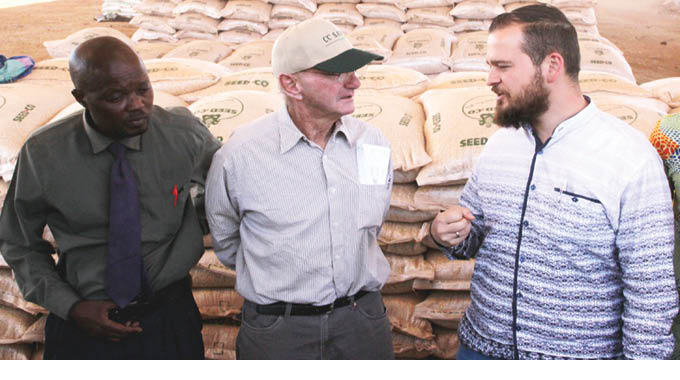Government to start free small grains seed distribution

Dumisani Nsingo, Senior Reporter
THE Government will soon distribute for free about 15 000 tonnes of small grain seed to cover more than 1,5 million hectares as part of its efforts to avert effects of climate change and improving food security.
Speaking at a Command Agriculture highlight programme at Mary Ellen farm in Bubi District, Matabeleland North Province yesterday Agriculture, Lands, Water, Climate and Rural Resettlement Deputy Minister Vangelis Peter Haritatos said the Government had already identified the small grain seeds it will distribute to farmers throughout the country.
“The seeds have been identified. Government will avail quite a lot. If I remember very well it’s about 15 000 metric tonnes of traditional grains in seed form, which can cover 1,5 million hectares. So certainly whatever the farmers want to grow the seed is available for free to the farmers,” he said.
Deputy Minister Haritatos said his visit to Matabeleland North was part of his nationwide tour to promote the production of small grains.
“The Government will provide seed free of charge for traditional grains that means if you want to crop one hectare or 100 hectares you will be given seed for free. Our expectations and conditions are we plant early,” he said.
Communal farmers are expected to grow a minimum of an acre to one hectare under small grains while newly resettled and A1 farmers are required to put at least a hectare, A2 and commercial farmers 10 hectares.
“We are saying if you are growing anything in Zimbabwe you must diversify a little bit of traditional grains . . . our colleagues at GMB (Grain Marketing Board) will facilitate aggregation and transportation of all traditional grains from rural areas to approved buyers or collection points,” said Deputy Minister Haritatos.
He said another plus for farmers was that the small grains would be paid the same price as maize.
Deputy Minister Haritatos said farmers should embrace the cropping of small grains due to their numerous benefits and high yield potential under harsh climatic conditions.
“We now have erratic rains, sometimes a lot of rains and sometimes no rains and what that means in order to mitigate against climate change, we need to diversify. So on that backdrop I would like to talk to you about the benefits of traditional grains. Traditional grains are drought tolerant. They have high water use efficiencies. They require only 250 to 600 millilitres per annum. They are adaptable to low rainfall and high temperatures, which makes them unique crops.
“The yields to us as farmers are still guaranteed despite poor rainfall or low rainfall. For example, sorghum varieties can yield nine metric tonnes per hectare so can finger millet, which has got the potential to yield two to three metric tonnes per hectare. They are also short term seasons, 80 to 119 days. Also traditional grains have low fertiliser application rate. You will be surprised to know that half of what is required in maize is required for traditional grains,” he said.
Deputy Minister Haritatos also highlighted the health benefits, which came with consuming small grains such as finger millet, pearl millet and sorghum.
“In general traditional grains are very important for food and nutrition of our country. These traditional and unrefined small grains are slowly digestible carbohydrates which decreases the risk of development of diet-related and chronic diseases. The release of sugar from our traditional grains is slow and therefore sustainable, maintain low blood sugar levels meaning if you have diabetes traditional grains are the best,” he said.
The Department of Agricultural Technical and Extension Services is in the process of registering all farmers willing to participate in the small grains planting programme throughout the country.
Zimbabwe will receive normal rains with a bias towards below normal throughout the 2019/20 season. — @DNsingo










Comments